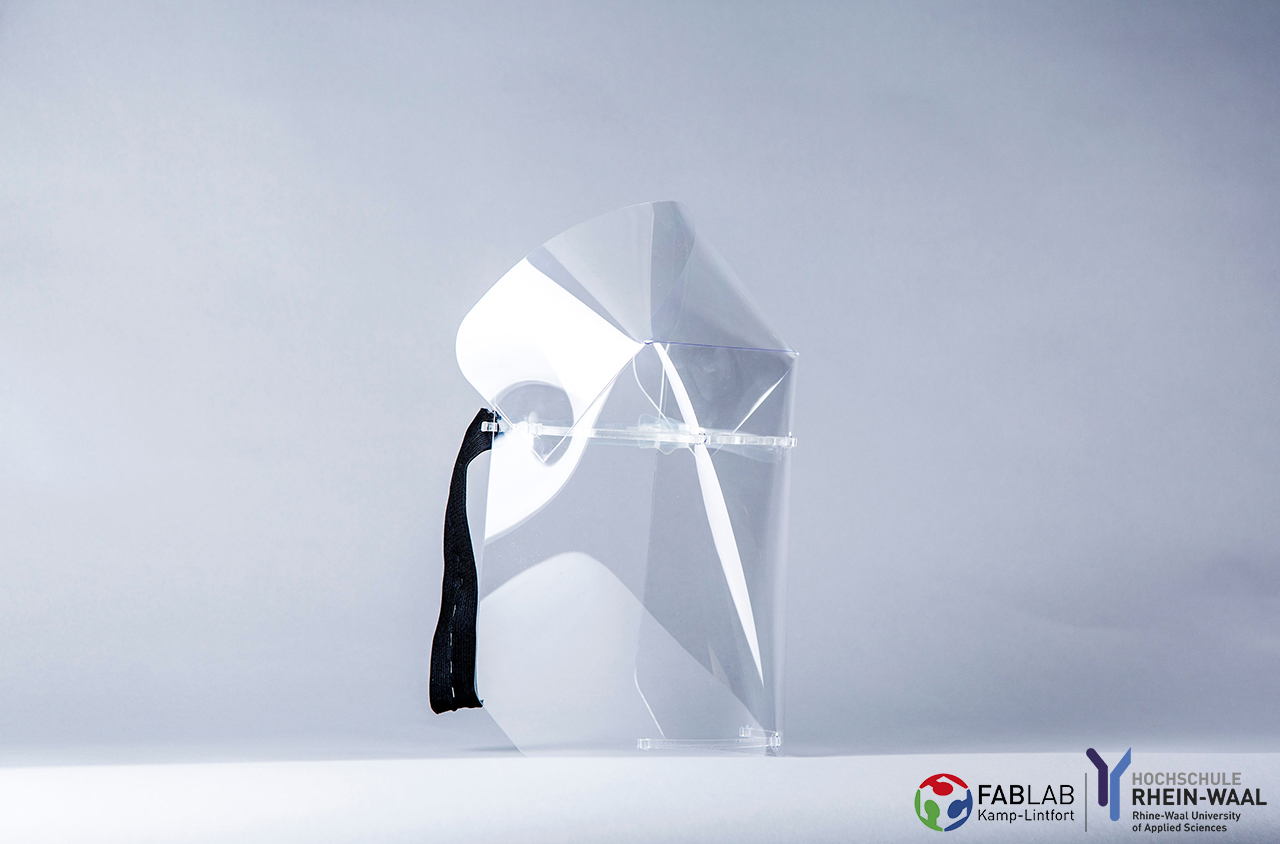Open Source Visor to Reduce the Chance of Infection through Droplets

The visor presented in this documentation was designed and developed by the Rhein-Waal University of Applied Sciences, in particular by its FabLab in Kamp-Lintfort. The development was done in close coordination with the St. Bernhard Hospital in Kamp-Lintfort. It was very important to us to find a solution that meets the requirements of the user (protection, comfort, disinfectable), but also that can be produced quickly and in large quantities.
Here we present an open source design which is primarily intended for production with a laser cutter. The production time naturally varies depending on the material and available laser, but in any case it is significantly less than with 3D printing.
Of course, we also offer a 3D printed variant (see download).
Production at the FabLab and Request for Support
The university will use the potential of its FabLab and within the scope of its capabilities produce as many masks as possible. Assuming the material is available, we estimate that we can manufacture several hundred visors per day. Additionally, other members of the local community have already contacted us and will also produce these visors.
The university can only take on the production task for a short time - we would like to ask local companies to get involved and, if necessary, also pick up some of the production using alternative manufacturing processes (such as injection molding, stamping, etc.).
Any companies interested in supporting the production of these visors or the delivery of materials are requested to contact the German Red Cross (DRK) Kreisverband Niederrhein by email. The address is: visiersupport@drk-niederrhein.de
Other FabLabs, Makerspaces and Hackerspaces may of course contact us: karsten.nebe@hochschule-rhein-waal.de
Recipient of our local fabrication
These visors are intended to serve all medical care facilities that want to protect their staff, patients and residents, e.g. hospitals, care and retirement homes, medical/dental practices or outpatient care services.
Due to the location of the university, our focus is initially on institutions in the Wesel and Kleve districts of North-Rhein Westfalia, Germany. We hope that other districts locally and regions worldwide will copy our approach. To check whether there is a FabLab in your vicinity, see https://fablabs.io
Costs are still being determined. All of the people involved in the project have so far been working on a cost-neutral basis. The underlying philosophy here is that the product should only be offered at cost price. Any “profits” that remain after costs are covered will be used for humanitarian projects. We are studying the possibility, if there is sufficient production capacity, to use any such leftover funds, coupled with potential additional donations, to make visors for delivery to Africa, Asia or South America.
Please note that this visor is explicitly not a medical product.
In Wesel and Kleve districts, the project is a multi-institutional collaboration.
A short-term working group has been put together to coordinate the project. Members include the DRK (German Red Cross) Kreisverband Niederrhein e.V. and the St. Bernhard Hospital, as well as the Rhine Waal University of Applied Sciences.
- Sales and logistics: DRK (German Red Cross) Kreisverband Niederrhein e.V.
- Material delivery: Coordinated by the German Red Cross with the involvement of the Development Agency for Economics (EAW) in the Wesel district, etc.
- Coordination and production is currently carried out by the Rhein-Waal University of Applied Sciences, but should be supported or largely taken over by local companies.
- The cleaning / disinfection and sterile packaging, after production, is organized by the St. Bernhard Hospital and the Medical Order Center in Bochum
- Distribution will be overseen by the central coordination centers of the districts or the DRK (German Red Cross)
Galery
Download of the Files
We have made a collection of all files. This includes the Lasercut-Version, the 3D-Print-Version and the manuals.
Downloads can be found here:
Credits
We would like to take this opportunity to say thank you to all who have helped so intensely during this extraordinary time and in particular to those who have contributed to the development of the design presented here. Special thanks go to two FabLab Kamp-Lintfort employees who developed the design: Ahmed Abdellatif and Daniele Ingrassia. Thanks to Adriana Cabrera who did the Layout of the manuals and thanks to Susanne und William Megill for the translations of all texts.
Thanks is due also to everyone else on the FabTeam, because without you this action would not have been possible.
Finally, we would like to express our thanks to all those involved in the above-mentioned organizations in the Wesel and Kleve district and all those who are so actively involved in the background.
The Pictures have been taken by Christian Spieß, TROK-MEDIA
